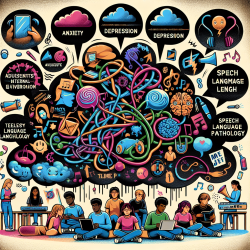The Impact of Eviction Moratoriums on Mental Health: What Practitioners Need to Know
The COVID-19 pandemic has not only been a health crisis but also a housing crisis. As a practitioner working with children, understanding the broader societal factors that influence mental health is crucial. A recent study published in JAMA Network Open titled "Variation in State-Level Eviction Moratorium Protections and Mental Health Among US Adults During the COVID-19 Pandemic" provides valuable insights into how eviction moratoriums impacted mental health during the pandemic.
Key Findings from the Research
The study analyzed data from the Understanding Coronavirus in America Survey, focusing on renters with annual household incomes less than $75,000. It found that strong eviction moratoriums, which blocked eviction notices and filings, were associated with a 12.6% reduction in mental distress. In contrast, weak moratoriums, which only blocked court hearings and enforcement, did not significantly reduce mental distress.
This finding suggests that the mental distress associated with eviction begins early in the process, with the threat of eviction notices and filings. For practitioners, this underscores the importance of early intervention and support for families facing housing insecurity.
Implications for Practitioners
As a practitioner, you can use these findings to inform your approach to supporting children and families. Here are some actionable steps:
- Early Identification: Be proactive in identifying families at risk of eviction and provide resources and support before the eviction process begins.
- Collaboration: Work with local housing authorities and community organizations to connect families with resources and support services.
- Advocacy: Advocate for policies that provide strong eviction protections and support affordable housing initiatives.
Encouraging Further Research
While this study provides important insights, further research is needed to understand the long-term impacts of eviction moratoriums on mental health, especially among children. Practitioners can contribute to this research by documenting their observations and experiences and collaborating with researchers to gather data.
Additionally, exploring the intersection of housing insecurity and other factors such as race, ethnicity, and socioeconomic status can provide a more comprehensive understanding of how eviction impacts mental health.
Conclusion
The findings from this study highlight the critical role of eviction protections in safeguarding mental health during times of crisis. As practitioners, we have a responsibility to support families facing housing insecurity and advocate for policies that promote mental well-being.
To read the original research paper, please follow this link: Variation in State-Level Eviction Moratorium Protections and Mental Health Among US Adults During the COVID-19 Pandemic.










